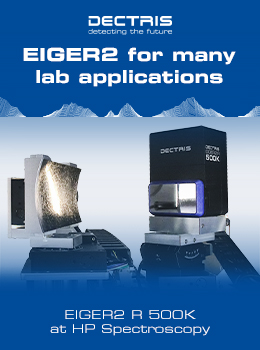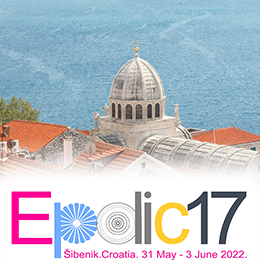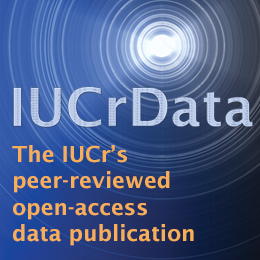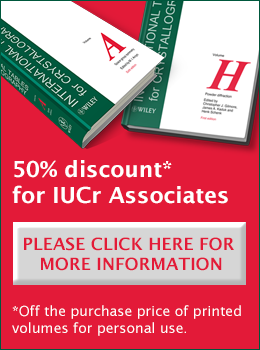
Letter from the President
Let’s stay united
![Thumbnail [Thumbnail]](https://www.iucr.org/__data/assets/image/0003/154398/Andrea-Letter3.png)
It is a difficult task to write a positive President’s Letter to you today. We are just stepping out from the long and difficult pandemic as we are watching in horror the development of the unjust and unprovoked but very deliberate war in Ukraine. Cities, lives and universities are being destroyed. Nobody expected it in the 21st century.
The IUCr denounces the war in Ukraine. We are greatly dismayed by the Russian military invasion of independent Ukraine, and we are concerned about its impact on the rest of the world. The IUCr stands in solidarity with the international scientific community as we are all concerned for the well-being and life of all Ukrainian people. Science must be seen as the stage set for dialogue and partnership between nations, even in times of geopolitical conflicts. The IUCr seeks ways to serve all its members worldwide during this difficult time; it declares its support for the rights and freedoms conveyed in the Universal Declaration of Human Rights for all people.
The IUCr condemns all wars, and calls for a halt to hostilities and for a peaceful end to this crisis.
Crystallography was always a science without borders, but now it is widening its scope to include more diversified topics as well as more diversified communities. We are about inclusion, not exclusion. When working in the IUCr we are all crystallographers and structural scientists. Not politicians, not social fighters, not tourists. Crystallography is a way of creative thinking. It is much more than just solving difficult structures or collecting and interpreting data. It reaches far beyond all of these; into creating new materials, modifying old ones, assessing resources on faraway planets, looking for new approaches to such ambitious targets as climate change, and promoting UN sustainability goals. The IUCr attitude is that we all have to collaborate to achieve these goals. We have to stay united and not allow the politicians to politicize our science. Let us hope that all scientists understand this.
We may not know what lies ahead for the world and for the IUCr, but at least we know what are we building upon.
The IUCr community has a lot to praise itself for. It is strong and vibrant, with more and more structural scientists joining our ranks. Financially – thanks to the IUCr Journals – we are doing reasonably well. When the world opens up – and settles down – we will be able to support young people willing to learn about crystallography at IUCr schools and meetings, and we will encourage our more experienced colleagues to enjoy sharing their knowledge, expertise and mentorship with the next generation of structural scientists.
To be able to do this, we need to stay consciously united even in this difficult time.
Many new initiatives have started recently and have proved to be very successful. The Rigaku School for Practical Crystallography ran again in January – thanks to Joe Ferrara and his team (see https://japan.rigaku.com/sites/default/files/newsletters/times.2022.01.pdf). The school attracted over 500 students, with a significant proportion of them from India, US, UK, Germany and Poland.
The “Distinguished Lectures on Quantum Crystallography and Complementary Fields” organized virtually by Krzysztof Wozniak and Paulina Dominiak (from the IUCr Commission on Quantum Crystallography) are another welcome initiative. So far, the Lectures have gathered about 140 participants from all over the world (see https://qcrwebinar.chem.uw.edu.pl).
We are grateful to these organizers and to all the others for attracting more colleagues to the beauty and challenges of structural science, for encouraging them to read and publish in IUCr journals and to work on IUCr Commissions.
The COVID time was difficult; we missed many opportunities. No sabbaticals, no in-person meetings and courses, no travel to visit scientific friends and mentors. At the same time, we also learned new skills: how to effectively conduct Zoom conferences and meetings across the continents, perform experiments remotely in large facilities, or run a very successful hybrid Congress with more than 1500 participants.
These skills are already helping us. Preparations for the next IUCr Congress in Melbourne, Australia, in 2023 are well on the way. The International Program Committee (IPC), headed by Brendan Kennedy and Megan Maher, will be announced on the 26th IUCr Congress website soon. Commissions are working on the session proposals. Australia opened up recently for international travellers. Some IPC members can now attend the Program Meeting in person in Melbourne or in Prague, while others will join by Zoom. Many Commissions have delegated their Australian members to represent them in the IPC. First, at the time of nominations, travel to Australia was restricted. The second argument is that shorter travel reduces both the airfare costs and the carbon footprint related to long-haul flights. Being responsible citizens of the world, we need to take all of this into account.
On a different note: it is with mixed feelings that I am announcing that the IUCr Research & Development Officer and our long-time colleague, Brian McMahon, retired from his position at the end of 2021. We wish him all the best, and we hope that he stays in touch with the IUCr. His creative input into this organization during his 35 years of service cannot be overstated enough.
I am also signalling that Dr Alex Ashcroft has just recently decided to retire. Alex, who has served as our accomplished Executive Secretary since 2017, is still working with us and will be helping us to find his replacement. The advertisement for this position can be seen here.
As humans, we need each other to create a brighter future, for ourselves and for the next generations. Do not allow external forces to create divisions and ruin our strongest achievement: the 75-year-old IUCr community.
Let this approach be our conscious way of fighting for peace.
Please stay connected and stay safe.
Copyright © - All Rights Reserved - International Union of Crystallography










